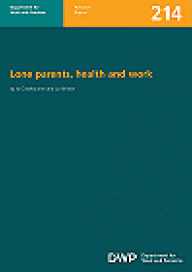Publications
 We author and publish a range of resources to keep you up to date with the latest developments in employment, labour market and human resource policy and practice.
We author and publish a range of resources to keep you up to date with the latest developments in employment, labour market and human resource policy and practice.
All our pdf publications are free to access.
-

Lone Parents, Health and Work
Casebourne J, Britton L, Morrin M | Jul 2004 | Department for Work and PensionsThis report brings together two pieces of qualitative research examining the impact of health problems on lone parents' decisions about work. In 2003 and 2004, 112 interviews and six focus groups were carried out with lone parents. The research examines the complex relationship between health and work for lone parents and determines whether there is more that can be done to support lone parents with health problems and, in particular, to help them enter the labour market.
-
📄
Promoting a Healthy Workforce
Hayday S | Jul 2004 | Institute for Employment StudiesWorkplace health promotion is a subject with which HR professionals are finding themselves involved more frequently these days. It has often been seen as the exclusive preserve of occupational health professionals, but with increasing concern over sickness absence and stress problems among employees, it is an area in which HR staff now need to have more than a passing knowledge.
-
📄
ESF Leavers Survey 2002 Objective 3: England
Atkinson J | Jun 2004 | European Social FundThis report presents results of a survey of 3,431 individual beneficiaries who left projects supported under ESF Objective 3 in England during the latter part of 2002. There was considerable variety between different kinds and circumstances of beneficiary, but underpinned by fairly widespread experience of disadvantage across much of the cohort.
-

Digest of Engineering
Statistics 2003/4 - Technologist Data Annex
Jagger N | Jun 2004 | The Engineering and Technology BoardThis publication is no longer available. This data annex provides background data for the review of the 'professional technologist' by the Engineering Technology Board. It gives basic data and brief analytical commentary from the Labour Force Survey. The report also introduces and documents a series of data classifications that it is hoped provide a useful way of examining the available data.
-

Why the Difference?
A closer look at higher education minority ethnic students and graduates
Connor H, Tyers C, Modood T, Hillage J | Jun 2004 | Department for Education and SkillsThis report, by IES for the Department for Education and Skills, contains the findings of a major research study over two years. It shows the various influences on minority ethnic participation and their achievement in higher education, and their transitions to the labour market. It presents the most comprehensive and detailed picture yet to emerge. The distribution of minority ethnic students is strongly skewed to particular universities, and they are underrepresented in some key subjects.
-

The Right Chemistry?
The choice of chemistry courses and careers
Jagger N | Jun 2004 | Royal Society of ChemistryThis report reviews the existing literature covering the factors that influence the choices that pupils and students make about studying chemistry and chemical careers. This publication is no longer available.
-
📄
Job Families
An Integrating Approach to Reward and Development?
Reilly P | May 2004 | Institute for Employment StudiesWhat are job families? Why are job families used in reward systems? What are the advantages of reward-linked job families? What do job families look like? This paper addresses these problems and discusses the practical issues and problems associated with job families.
-

An EU Code of Ethics for Socio-Economic Research
Dench S, Iphofen R, Huws U | May 2004 | Institute for Employment StudiesThe RESPECT project involved the development of guidelines, or codes, in a number of separate areas: data protection, intellectual property rights, research ethics, professional issues and professional competencies. This report addresses one aspect of the RESPECT project: the development of a set of ethical guidelines or a 'code' of standards to inform the conduct of socio-economic research in the European Union.
-

Intellectual Property Aspects of Socio-Economic Research
Gnädig N, Knorpp K, Grosse Ruse H, Giannakoulis M | May 2004 | Institute for Employment StudiesSocio-economic research creates intellectual property and is itself based on intellectual property. The rules concerning intellectual property rights should always be kept in mind when conducting any kind of socio-economic research. The guidelines in this report should enable those concerned with socio-economic research to take an overview of the rights at stake, and how to take them into account.
-

Functional Map of a European Socio-Economic Research Project
Schryvers E, Van Gyes G, Vanderbrande T | May 2004 | Institute for Employment StudiesThe RESPECT project involved the development of guidelines, or codes, in a number of separate areas: data protection, intellectual property rights, research ethics, professional issues and professional competencies. This part of the RESPECT project created a professional competency profile.
